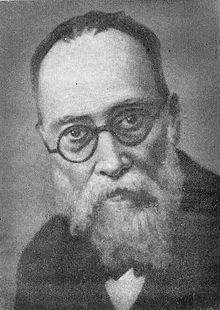
Back أنتوان مييه Arabic انتوان مييه ARZ Антуан Мее Byelorussian Антоан Мейе Bulgarian Antoine Meillet Catalan Antoine Meillet Czech Антоуанъ Мєѥ CU Antoine Meillet Danish Antoine Meillet German Antoine Meillet Esperanto
Antoine Meillet | |
|---|---|
 | |
| Born | Paul Jules Antoine Meillet 11 November 1866 Moulins, France |
| Died | 21 September 1936 (aged 69) Châteaumeillant, France |
| Nationality | French |
| Alma mater | University of Paris |
| Institutions | Collège de France, Institut national des langues et civilisations orientales, |
Main interests | Comparative Linguistics, Armenian linguistics, Philology |
Notable ideas | Epithets in Homer, Meillet's law |
Paul Jules Antoine Meillet (French: [ɑ̃twan mɛjɛ]; 11 November 1866 – 21 September 1936) was one of the most important French linguists of the early 20th century. He began his studies at the Sorbonne University, where he was influenced by Michel Bréal, the Swiss linguist Ferdinand de Saussure, and the members of the L'Année sociologique. In 1890 he was part of a research trip to the Caucasus, where he studied the Armenian language. After his return, de Saussure had gone back to Geneva, so Meillet continued the series of lectures on comparative linguistics that de Saussure had given.
In 1897 Meillet completed his doctorate, Research on the Use of the Genitive-Accusative in Old Slavonic. In 1902 he took a chair in Armenian at the Institut national des langues et civilisations orientales and took under his wing Hrachia Adjarian, who would become the founder of modern Armenian dialectology. In 1905 Meillet was elected to the Collège de France, where he taught on the history and structure of Indo-European languages. One of his most-quoted statements is that "anyone wishing to hear how Indo-Europeans spoke should come and listen to a Lithuanian peasant." He worked closely with linguists Paul Pelliot and Robert Gauthiot.
Today Meillet is remembered as the mentor of an entire generation of linguists and philologists who would become central to French linguistics in the twentieth century, such as Émile Benveniste, Georges Dumézil, and André Martinet.
In 1921, with the help of linguists Paul Boyer and André Mazon, he founded the Revue des études slaves.